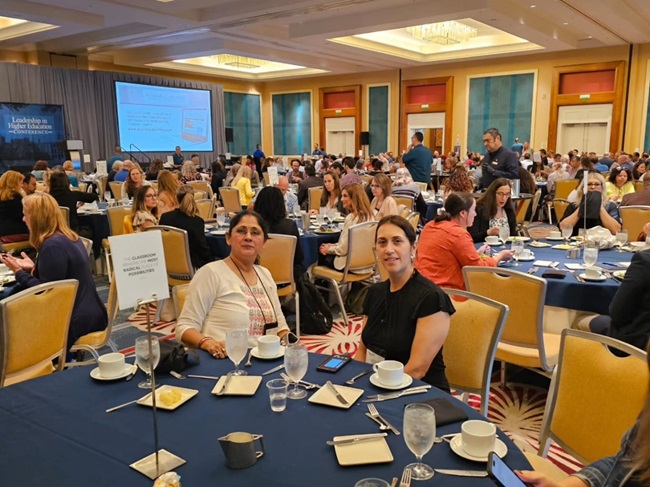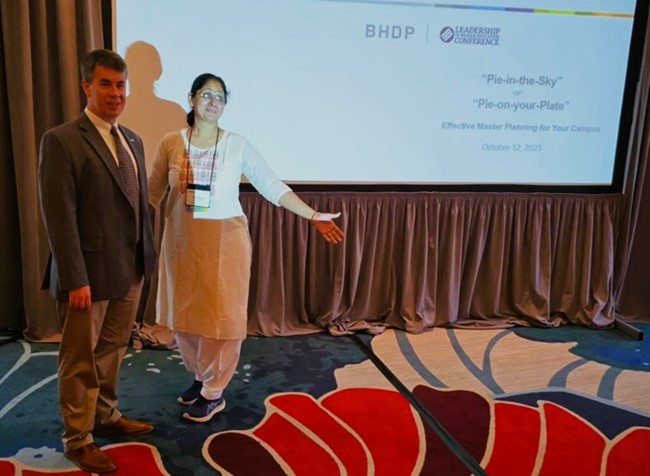Apr 24, 2025
Apr 24, 2025
A Report on the Conference
held from October 12 to October14, 2023 in Orlando, Florida, USA
Leadership in Higher Education Conference is one of the established international conference series being organized by Magna Publications for the last four decades. This year, at Hilton Parkway, Orlando, about three hundred aspiring and established leaders of higher education from USA, Canada, Thailand, South Africa, India, Saudi Arabia gathered to discuss various aspects of university and higher education scenario.

On 12th I attended 'Leadership Bootcamp: Developing Academic Leadership Skills in Higher Education'. Sara Zeiglar, Provost, Eastern Kentucky University and Russell Carpenter from the same university were the presenters. I presented my views in this bootcamp for which I have been given a badge of recognition as well.

My views are here in a nutshell - When we envision our Leadership action plan, short term planning requires vigor, time and conviction. A five-year vision plan will require a detailed plan coupled with action, persistence and patience. A long-term vision plan will need considerations of community benefit, personality development of students and self enhancement both for faculty and students.
Leadership in higher education must be introspective. Self-reflection is necessary for a Vice-Chancellor, Provost or University President. The leadership must know how to accept and face obstacles. The leadership has to be inclusive. The leader must be able to show benefits of change to the members of the institution. The leader has to set the ball rolling, begin new projects, initiate desired changes and see how far the institution can go. The leader has to be the person who walks the talk. Credibility is the key.'
Every participant in the bootcamp had to give one line mission statement. My line was - ' Do as much good as possible to as many people as possible.'
On 13th, my first session was on campus development. I chose this session as it bore great relevance to my university. We at Chhatarpur are in the process of campus development. I told the group about the uniqueness of Bundelkhand region, and it's needs. Some of the takeaways are - The campus ought to be ready for post pandemic adaptation. The demographic details of the students matter the most. A master plan is necessary. Adherence to the master plan is also necessary. The plan should be realistic. It must have training facilities for the work force.
The next session on 13th was on ethical leadership. I also gave my views on the topic. Ethical Leadership flourishes in ethical surroundings. If the surroundings and its values are non-ethical, the leadership will have to adapt and change accordingly. In practical terms, an ethical leader as one whose words and actions match and gel. Respecting others is an important component of ethical leadership. Leadership is all about others, building the lives of other people and boosting their morale. Service is key to ethical leadership. Clotilde Dudley Smith, Director, Quinnipiac University was the presenter.
The next session was on 'Managing Conflict: A Leader's Guide to Handling Challenging Situations'. Sara Melita, Felicitator, George Washington University was the presenter. This was by far the most engaging and energetic session of the whole conference. It was heavily attended as well.
I got to see that conflict management is not a problem typical to me or Indian universities per se; it is a global academic issue. It is important to learn about it. The first thing is to know that conflict is an integral part of campus life. Conflicts are unavoidable. Sometimes conflicts are healthy as they propel change and improvement. The real conflict arises when goals and intentions of two people or two groups do not match. One wants to develop a class; the other one wants to escape work. Or if someone wants you to fail, then in such situations there can be NP conflict resolution; there can only be avoidance.
Managing conflict is different from providing feedback. The kind of conflict I have to manage on my campus and jurisdiction in Chhatarpur I'd mostly about leveraging dominance. When one faculty member or officer or employee wants to dominate fellow co-workers and wants the administration to be a party, then it becomes a conflict situation. One Professor would want all administrative decisions to be taken as per his will and that would create trouble. The role of the leader in such situations is to remain objective, fair and transparent. The leadership cannot side with one group. The leader has to take in all.diverse opinions, promote new ways of thinking and suggest options. There are five styles of resolving conflict - competing, problem solving, compromising, avoiding, and accommodating. A leader's style ought to be a mix of all techniques. A leader must be able to separate facts from stories. S/he must be able to see all parts of the contrasting statements. Creating a mutual purpose can also be a way out. S/he must disentangle impact and intent and think like a mediator. It is always better to think in third person when one is in a conflict situation. One must quit taking things personally.
14th October 2023 was the last day of the engaging and eventful conference. The day began with a plenary session 'Crewing Durable Change: A Guide for Higher Education Leaders'. The presenter was Stephanie Delaney, Vice President, Renton Technical College. Leaders of higher education have to be experts of managing personally as well as institutional relationships. S/he has to know the art of dynamic stability wherein one practices certain practices and values consistently and yet remains open to change and adaptation. The leader's communication ought to be effective. The leader must be self-aware. This is the key. Self-evaluation is the most important tool that a leader can practice to further her or his capacities. The importance of professional learning cannot be overemphasized. The leader of a higher education institution should be able to manage time we'll and should have the internal resources of retaining new learning. It is a good idea to impart some kind of orientation to academic leaders.
The next session on 14th was on leadership of women in higher education- 'Women Stepping Up to Lead: Three Different Perspectives'. The three presenters Kimberly Grainger, Diane Chapman, and Maria Gallardo-Williams were from North Carolina State University. A true leader of higher education must be able to make others work for change even if it requires hard work. Those working under the leader must be able to see her/his point of view. Why do we want this change - this must be made clear. There are four theories of leadership- innate, learned, situational and transactional. The presenters emphasized that there is an urgent need to have more women leaders. This progression of women ought to be natural and smooth. Networking is important. Women Professors aspiring to be academic Leaders must be capable and empowering. They can be given training. They must build networks. Formal leadership programming has a definite role. Governments must update their policies in this regard. With the purposeful recognition of women, hugger education will make a meaningful change to human development.
In the final leg, we had interaction with board members of Magna Publications. Various useful handouts have been given to me which I have brought back with me. I will be sharing them with the faculty of my university. The conference has been truly enriching. Being brought up in a small town of Madhya Pradesh and having studied in government schools and government colleges, I felt proud of myself that I could make a mark at the international event. I feel convinced that public education system of India and of Madhya Pradesh in particular is robust; it will be the harbinger of the new dawn for the Indian society at large.
28-Oct-2023
More by : Prof. Shubha Tiwari

|
I am so happy |